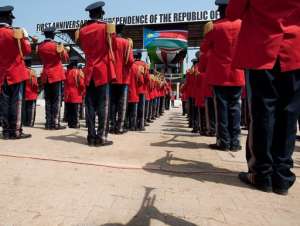
On 6 March, 1957, Ghana gained independence from the British, becoming the first of the South Sahara to do so, and becoming the poster boy for other African nations to later follow in its step.
Underlining the self-governance struggle was the quest to have control and manage its socio-economic affairs free of interference from any colonial master.
Many people had to sacrifice their freedom and livelihood to ensure the realization of our independence.
Beyond the frontline were farmers, traders and students who had high hopes and aspirations that independence from the colonial masters meant new ways of doing things and a change in their economic fortunes and sparing the new nation to a greater industrial revolution.
Pre-independence, Ghana’s economy was driven mainly by the exploitation of minerals with gold being the dominant, timber, salt, cocoa and other commodities. Ghanaians were mainly into agriculture as the dominant source of livelihood.
The Structural development was engineered mainly to assist in the export of these commodities. The railways, roads and ports were all developed strategically to aid in the cutting of these raw materials from the hinterland and bringing them to the ports where they were shipped to our colonial masters who will later turn them into finished goods and sell them to us at neck-breaking prices.
On the dawn of 6 March, 1957, when Ghana’s first president, Osagyefo Kwame Nkrumah declared to the whole world, that the Blackman is capable of managing his affairs, it was the expectation that the economy will be re-engineered to expand it and give maximum benefit to the citizens and move away from the exploitation and exportation of raw materials.
This was reaffirmed by Nkrumah’s economic policies also known as Nkrumah’s seven-year development plan.
With a population of about six million and a foreign cash reserve that was at par with some of today’s Asian countries, many would have thought that Ghana was on the path to great fortunes.
While some justification can be given for the dip in economic fortunes post-independence due to political term oils that plagued Ghana post-independence however, a close comparison with other nations who had worse economic fortunes will reveal how Ghana’s socio-economic situation has taken a turn for the worse.
During the period of 1970s and 1980s, Ghana’s promising economy had been so run down that it had to undergo two major structural programs to bring it back to the immediate post-independence era.
From 1992 when the 4th republic began, Ghana has enjoyed a period of stable democratic regimes which ordinarily should be a catalyst for growth and development.
Though some relative economic growth has taken place, the majority of Ghanaians still practice small-scale agriculture and the economy is still highly dependent on the exploitation and exportation of raw materials.
A few small and medium scale industries have sprung up post the fourth republic, these are foreign owned. Ghana’s oil sector has also been on the rise. However, like all policies, the benefits of these are felt by the western world who always determine the nature of our industrial policies due to the penchant of our leaders to run to the western world at the least economic turmoil.
Despite the reforms and the many policy proposals by Ghana’s vibrant civil society players, the winner takes all attitude, political self-aggrandizement, and the non-implementation of laws and policies have left many Ghanaians questioning the meaning of independence.
After 66 years of speeches and parading in the scorching sun, many would have thought that we will celebrate our independence with new ideas however we are staying faithful to the colonial practices that we fought against.
Despite the over-exploitation of our land and natural resources, Ghana is still blessed with endless man and material resources that can turn any right-thinking nation from 3rd world to a 1st class superpower nation.
Soon it will be 67 years of independence, it is the hope and aspiration of Ghanaians to see a change in attitude, a shift in policy and new ways to celebrate our Independence Day parade.
God bless our homeland Ghana and make it great and strong.
AUTHOR:: FRANCIS A. MARLEY




 Akufo-Addo spotted ordering chiefs to stand for his handshake
Akufo-Addo spotted ordering chiefs to stand for his handshake
 Akufo-Addo ‘disrespects’ every chief in Ghana except Okyenhene — NDC Communicato...
Akufo-Addo ‘disrespects’ every chief in Ghana except Okyenhene — NDC Communicato...
 Supreme Court clears way for dual citizens to hold key public positions
Supreme Court clears way for dual citizens to hold key public positions
 Be transparent, don’t suppress the truth – Prof. Opoku-Agyemang to Jean Mensa
Be transparent, don’t suppress the truth – Prof. Opoku-Agyemang to Jean Mensa
 ‘I won’t tell the world I was only a driver’s mate during challenges’ – Prof Jan...
‘I won’t tell the world I was only a driver’s mate during challenges’ – Prof Jan...
 We’ll prosecute corrupt officials of Akufo-Addo’s govt – Prof Jane Naana
We’ll prosecute corrupt officials of Akufo-Addo’s govt – Prof Jane Naana
 [Full text] Acceptance speech by Prof Jane Naana Opoku-Agyemang as 2024 NDC Runn...
[Full text] Acceptance speech by Prof Jane Naana Opoku-Agyemang as 2024 NDC Runn...
 Election 2024: Don’t be complacent, we haven’t won yet – Asiedu Nketia cautions ...
Election 2024: Don’t be complacent, we haven’t won yet – Asiedu Nketia cautions ...
 Election 2024: Stop fighting over positions in Mahama’s next govt – Asiedu Nketi...
Election 2024: Stop fighting over positions in Mahama’s next govt – Asiedu Nketi...
 Prof Jane Naana Opoku-Agyemang will restore dignity of vice presidency – Fifi Kw...
Prof Jane Naana Opoku-Agyemang will restore dignity of vice presidency – Fifi Kw...
